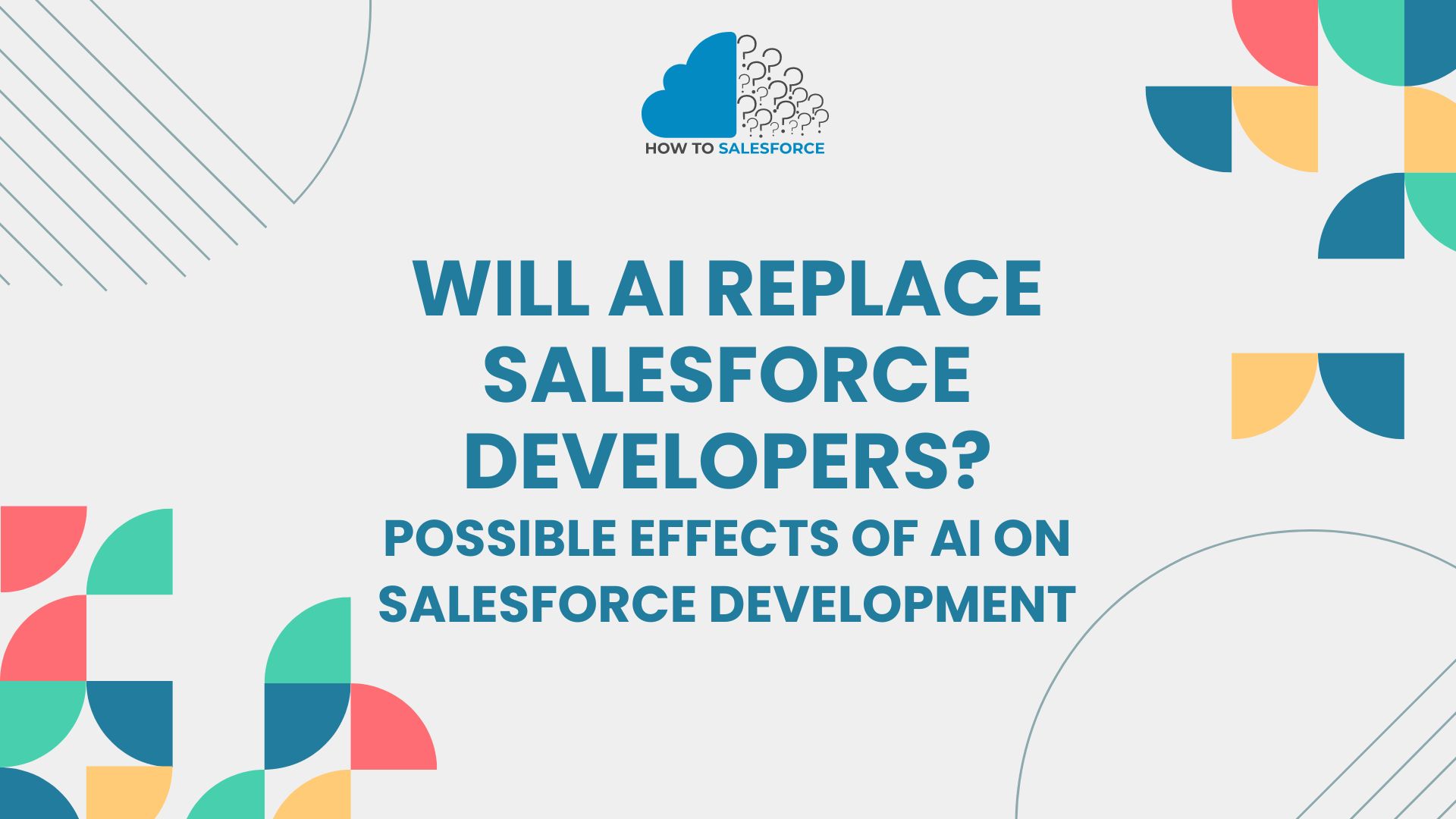Introduction
The rapid advancement of automation technologies has raised the possibility of Salesforce developers being replaced by AI. This blog article, Will AI Replace Salesforce Developers?, examines Salesforce developers’ skills, restrictions, and future position in an AI-driven world.
Hey there, look at the blog post Salesforce Developers | Responsibilities, Required skills & Best Practices.
Salesforce Developers’ Role
Salesforce developers are experts in their fields and make changes and additions to the Salesforce platform to meet the needs of each company. Some of their jobs are
- Custom Application Development: Creating customized apps with Salesforce technologies like Apex, Visualforce, and Lightning Components.
- System Integration: Ensuring smooth data flow by integrating Salesforce with other enterprise platforms.
- Data Management: Ensuring data integrity and putting strong data models into practice.
- Automation: Automating workflows and scripts to streamline corporate processes.
For these tasks, you need to have technical knowledge, an understanding of business processes, and a deep understanding of the Salesforce software.
Principal Duties
- Building Custom Solutions: Creating unique features and functionalities to meet certain needs of the business.
- Implementing Best Practices: Making certain that solutions follow Salesforce policies and best practices.
- Maintaining and Enhancing Systems: Maintaining and enhancing current Salesforce deployments on a constant basis.
- Partnering with Stakeholders: Assisting business stakeholders in comprehending their requirements and converting them into technological fixes.
Recognizing AI in Salesforce
Artificial intelligence has been added to the Salesforce environment with the help of programs like Salesforce Einstein. Several features of Salesforce are made better by these AI-powered solutions. For example, automatic exchanges with customers and prediction analytics are made better.
Salesforce Einstein
Salesforce Einstein is a tool for artificial intelligence that adds deep learning, advanced machine learning, and natural language processing to Salesforce.
- Einstein Analytics: Offers sophisticated data insights and analytics.
- Einstein Bots: Uses chatbots to automate customer support conversations.
- Einstein Prediction Builder: Builds personalized artificial intelligence models for forecasting.
- Einstein Voice: Facilitates conversations with Salesforce using voice commands.
Salesforce’s AI capabilities
There are many powerful tools in Salesforce AI, such as
- Predictive Analytics: Data analysis to forecast patterns and actions in the future.
- Automated Insights: Drawing conclusions from massive datasets that are actionable.
- Natural Language Processing: Improving consumer interactions through the comprehension and processing of human language.
- Machine Learning: Using data to learn, make better decisions, and automate processes.
These features make Salesforce more useful and smarter, as well as more intelligent and effective.
AI’s Possible Effect on Salesforce Development
AI could have a big effect on Salesforce development by automating some tasks and making workers better at what they do.
Automating Typical Tasks
Using AI to handle regular and repeated tasks frees up Salesforce workers to work on more complex and strategic tasks.
- Automated Code Generation: Given high-level specifications, AI systems can produce complete modules or just snippets of code.
- Error Detection: AI is able to recognize and fix frequent coding mistakes.
- Automated Testing: Regression tests can be automated, and any problems can be found with testing tools powered by AI.
Improved Tools for Development
AI can make software tools better by making them more useful and effective.
- Intelligent Code Editors: Code editors with AI capabilities are able to offer optimizations and recommendations in real time.
- Automated Documentation: When code changes, AI can create and update documentation.
- Advanced Debugging: By figuring out the underlying causes of problems and offering solutions, AI can help with debugging.
Enhancement of Decision-Making
Developers can make better decisions with the help of AI and data.
- Performance Optimization: AI is able to assess the performance of an application and recommend improvements.
- User Behavior Analysis: AI can shed light on user behavior, enabling developers to design more solutions that are centered around the needs of users.
- Predictive Maintenance: By using AI to anticipate possible problems before they arise, proactive maintenance is made possible.
AI’s Restrictions in Salesforce Development
AI has some limitations that keep it from fully replacing Salesforce developers, even though it has a lot of promise.
Insufficient Contextual Knowledge
Artificial intelligence isn’t as good at understanding context as programmers are.
- Business Knowledge: Salesforce developers are aware of the particular needs and business procedures within their company.
- Customization: AI may locate it difficult to solve complex or highly customized problems that call for original thinking.
- Stakeholder Collaboration: To obtain requirements and offer input, human developers can interact with stakeholders in an efficient manner.
Security and Ethical Issues
AI creates problems with safety and morality that need to be fixed.
- Data Privacy: Making sure AI abides by legal requirements and protects data privacy.
- Bias and Fairness: To guarantee impartial and fair results, potential biases in AI systems are addressed.
- Security Vulnerabilities: Preventing possible security breaches on AI systems.
Reliance on Good Information
AI depends a lot on the quality of the data it is trained on.
- Data Quality: Inaccurate forecasts and insights might result from poor data quality.
- Data Availability: Insufficient data can make AI models less effective.
- Data Integration: It can be difficult to guarantee smooth data integration between several systems.
Salesforce Developers’ Future Role
AI will definitely change how Salesforce is developed, but it probably won’t replace all Salesforce workers. AI, on the other hand, will make them better at what they do and change the way they work.
Changing Competencies
In a world run by AI, Salesforce developers will need to learn new skills to stay useful.
- AI and Machine Learning: Gain an understanding of these principles to make efficient use of AI tools.
- Data Science: Learning data science concepts to work with insights powered by artificial intelligence.
- Automation Tools: Mastering the use of tools to automate development processes.
- Understanding the ethical implications of AI and ensuring its responsible use is crucial.
Prioritize Creative and Strategic Work
When AI takes care of boring tasks, Salesforce developers can focus on more creative and important parts of their business.
- Innovative Solutions: Creating cutting-edge solutions by utilizing AI’s capabilities.
- Corporate Strategy: Matching larger corporate strategies with Salesforce solutions.
- User Experience: Improving user experience by means of sophisticated and tailored interfaces.
Working together with AI
Salesforce developers will utilize AI tools to boost their efficiency and productivity.
- AI-Assisted Development: Using AI technologies to enhance code quality and accelerate development.
- Continuous Learning: Keeping abreast of the most recent developments in AI and persistently picking up new abilities.
- Human-AI Collaboration: Working together with AI to find better answers to challenging issues.
Preserving Human Touch
AI can do a lot of work automatically, but Salesforce development still needs people to work together.
- Empathy and Understanding: Being aware of the requirements and problems that stakeholders and users face.
- Creative Problem-Solving: Utilizing originality and inventiveness to address particular difficulties.
- Building Relationships: Establishing trusting bonds with teammates and stakeholders.
Practical AI Use Cases in Salesforce Development
A lot of businesses have already started using AI in their Salesforce development, which shows that it could be useful and lead to growth.
Automated Generation of Code
Some companies use AI solutions to automatically create small pieces of code, which cuts down on development time and boosts productivity.
- Instance: AI-powered code generating programs such as GitHub Copilot helps developers create code more quickly by offering real-time code suggestions.
AI-Driven Customer Analytics
By looking at customer data and giving devs useful insights, AI helps them make apps that are more focused on the user.
- Salesforce Einstein Analytics’ sophisticated analytics and predictive insights enable developers to develop data-driven apps.
Perceptive Chatbots
Salesforce has built-in AI in its apps to make customer service easier and the user experience better.
- Example: Human agents can concentrate on more complicated problems by delegating routine client inquiries to Einstein Bots.
Predictive Upkeep
Since AI can guess what problems might happen with a system before they do, writers can do preventative maintenance.
- Example: Artificial intelligence (AI)-driven predictive maintenance systems examine usage trends and system logs to spot possible issues and suggest solutions.
Conclusion
Although AI will change the Salesforce development environment, it is unlikely to completely replace Salesforce professionals. AI will improve their skills and allow them to focus on more creative and strategic tasks.
Salesforce developers will need to change the skills they use, learn how to use AI, and keep the human touch that makes development work. By being aware of the effects AI might have and making plans ahead of time, Salesforce developers can keep playing an important role in helping businesses succeed.


